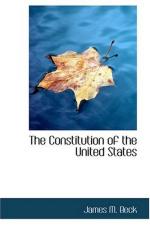By the Articles of Confederation, which, as stated, became effective in 1781, the conduct of foreign affairs was vested in the new government, which was also given the power to create admiralty courts, regulate coinage, maintain an army and navy, borrow money, and emit bills of credit, but the great limitation was that in all other respects the constituent States retained absolute power, especially with reference to commerce and taxation. All that the central government could do was to requisition the States to furnish food supplies, and the States were then left to impose the taxes and, if necessary, to enforce their payment in their own way, with the inevitable result that they vied with each other in the struggle to evade them. The Confederation had no direct power over the citizens of the several States. Moreover, the Congress could not levy any taxes, or indeed pass any measure unless nine out of the thirteen States agreed, and the Constitution could not be amended except by unanimous vote. While the Congress could select a presiding officer to serve for one year, yet he had no real executive authority. During the recess of the Congress, a committee of thirteen, consisting of one delegate from each State, had ad interim powers, but not greater than the Congress, which they represented.
Such a government would have been fatal to any people, and so it nearly proved to be to the infant nation. Two circumstances saved them from the consequences of such incapacity: one was the invaluable aid of France, and the other the personality of George Washington. Of this great leader, one of the noblest that ever “lived in the tide of time,” it is only necessary to quote the fine tribute paid to him by the greatest of the Victorian novelists in his Virginians:
“What a constancy, what a magnanimity, what a surprising persistence against fortune!... Washington, the chief of a nation in arms, doing battle with distracted parties; calm in the midst of conspiracy; serene against the open foe before him and the darker enemies at his back; Washington, inspiring order and spirit into troops hungry and in rags; stung by ingratitude, but betraying no anger, and every ready to forgive; in defeat invincible, magnanimous in conquest and never so sublime as on that day when he laid down his victorious sword and sought his noble retirement—here, indeed, is a character to admire and revere; a life without a stain, a fame without a flaw.”
A year after the Articles of Confederation had been adopted, the war came to an end by a preliminary treaty on November 30, 1782.




